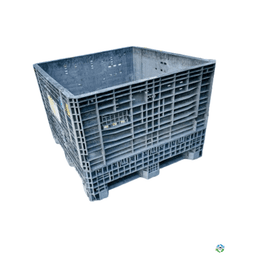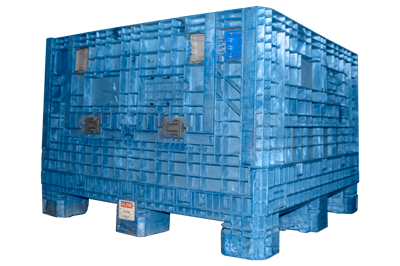Maximize your warehouse space with used collapsible bulk containers for streamlined handling
Wiki Article
How Mass Containers Can Improve Efficiency in Your Product Packaging Procedures
Mass containers play a necessary duty in maximizing packaging procedures. Their layout allows far better use upright room and promotes organized stock monitoring. This effectiveness leads to decreased material replenishment frequency and reduced labor expenses. Additionally, the longevity of these containers lessens product damages. As organizations seek ways to improve their processes, recognizing the complex benefits of bulk containers ends up being crucial. What other advantages might they give the table?Structured Storage Solutions
As companies seek to optimize their procedures, streamlined storage space solutions have ended up being crucial for enhancing packaging efficiency. Effective storage space not just saves space yet also helps with quicker accessibility to materials, which is vital in hectic production atmospheres. Mass containers, designed for easy stacking and company, substantially minimize the complexity of storage systems. They permit businesses to optimize vertical area while reducing the footprint needed for stock.Additionally, these containers typically include ergonomic styles that streamline taking care of and transport, reducing the risk of injury and enhancing workflow. By combining materials in bulk containers, business can reduce the frequency of restocking and simplify their supply chain procedures. On the whole, the execution of reliable storage space remedies cultivates a more organized workspace, leading to enhanced efficiency and decreased operational prices. With thoughtful style and tactical use bulk containers, organizations can accomplish notable enhancements in their packaging operations.

Waste Reduction and Sustainability
While the pursuit of effectiveness typically drives packaging choices, waste decrease and sustainability have emerged as necessary factors to consider in modern-day operations. Companies progressively identify that taking on bulk containers can greatly decrease material waste. These containers typically make use of less packaging product than typical approaches, leading to a smaller sized carbon footprint.Bulk containers can be reused multiple times, which further lowers the demand for single-use product packaging and minimizes total waste entering landfills. Their design often allows for easier recycling procedures, straightening with sustainability objectives.
In addition, firms that focus on waste decrease can boost their brand reputation, appealing to eco aware customers. By carrying out mass containers, businesses not just enhance procedures however also add favorably to ecological stewardship. This double benefit of functional effectiveness and sustainability positions firms favorably in an open market significantly focused on green practices.
Boosted Setting Up Line Effectiveness

Applying mass containers on production line substantially enhances performance by simplifying the handling and transportation of products. By making use of mass containers, suppliers can decrease the frequency of material replenishment, allowing employees to concentrate on assembly jobs instead of consistent stock monitoring. This leads to fewer disruptions and a smoother operations, ultimately improving efficiency.
Furthermore, mass containers are designed for easy assimilation with automated systems, further optimizing the assembly process. Their standard dimensions and shapes promote far better organization, enabling employees to locate and accessibility materials swiftly. This decrease in search time adds to an extra fluid production setting.

Cost Financial Savings and Enhanced Earnings Margins
Notable cost savings can be realized with the fostering of bulk containers in packaging processes. By lowering the need for numerous smaller packages, companies can reduce product costs notably. Mass containers frequently need much less packaging material on the whole, causing reduced expenses on materials. In addition, the efficiency of bulk handling reduces labor expenses related to packaging and unpacking, further improving savings.Fewer journeys to distributors and lowered transportation costs are also vital benefits, as mass containers permit increased product capacity per delivery. This greater quantity not only lowers delivery costs yet likewise enhances storage room within centers, leading to improved supply monitoring.
In addition, the sturdiness of mass containers usually converts to decrease damage prices during handling and transport, protecting item honesty and lowering waste. Collectively, these aspects add to better profit margins, making bulk containers an economically advantageous selection for organizations seeking effectiveness in their product packaging operations.
Versatility Throughout Industries
Mass containers use exceptional versatility throughout different industries, making them an important property past just cost financial savings. In the food and beverage market, these containers help with the secure transport and storage of big amounts of components, boosting efficiency in production lines. In pharmaceuticals, bulk containers ensure compliance with rigid hygiene standards while accommodating the bulk handling of resources. The chemical industry also benefits, as these containers withstand rough compounds and stop contamination, here sustaining risk-free procedures. used collapsible bulk containers. Furthermore, the farming sector utilizes mass containers for delivering grains and fertilizers, optimizing logistics and lowering waste. Their versatility includes manufacturing, where mass containers simplify assembly procedures and reduce the need for excessive product packaging. This cross-industry capability not just enhances functional performance however likewise promotes sustainability through lowered packaging waste, highlighting the indispensable role bulk containers play in modern-day supply chainsFrequently Asked Questions
Just How Do Mass Containers Impact Worker Security in Product Packaging Procedures?
Bulk containers substantially improve employee safety and security in packaging operations by reducing hand-operated handling, lessening injury threats, and promoting ergonomic practices. Their design facilitates safer transportation and storage space, eventually creating a much more safe and secure workplace for all staff members.
What Products Are Mass Containers Commonly Made From?
Bulk containers are commonly made from long lasting materials such as high-density polyethylene, timber, polypropylene, or metal - used bulk containers. These materials offer strength, resistance to ecological factors, and suitability for numerous materials, guaranteeing reliable and secure transportation of products
Can Mass Containers Be Personalized for Certain Products?
Yes, bulk containers can be customized for certain products. Producers frequently customize dimensions, products, and features to satisfy special needs, making sure perfect defense and performance throughout storage and transportation of various products.Exactly How Do Bulk Containers Affect Transportation Logistics?
Mass containers streamline transport logistics by making the most of freight space, minimizing the variety of trips needed, and reducing taking care of costs (used collapsible bulk containers). Their standard dimensions facilitate reliable unloading and packing, ultimately leading to enhanced operational effectiveness throughout the supply chainWhat Is the Life Expectancy of Bulk Containers in Regular Use?
The lifespan of mass containers in normal usage typically ranges from 5 to 10 years, depending on worldly top quality, handling methods, and ecological problems. Appropriate upkeep can significantly prolong their functionality and efficiency.Applying bulk containers on assembly lines greatly boosts effectiveness by improving the handling and transportation of materials. Mass containers commonly need less product packaging material on the whole, resulting in lower expenditures on materials. In drugs, mass containers ensure compliance with strict health criteria while accommodating the bulk handling of raw products. Their adaptability expands to manufacturing, where mass containers streamline assembly procedures and lower the demand for too much packaging. Bulk containers significantly enhance employee safety and security in product packaging procedures by lowering hand-operated handling, lessening injury dangers, and promoting ergonomic practices.
Report this wiki page